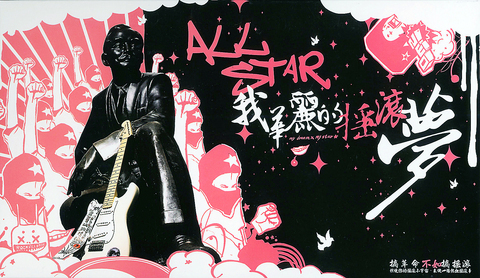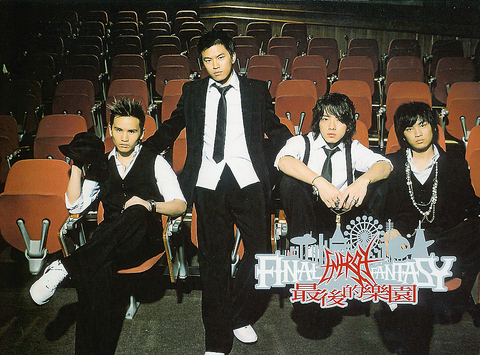All Star
Various
Rock

Known for its neatly packaged mainstream Mando-pop artists rather than for promoting self-styled indie/alternative acts, Taiwan's Rock Records recently went against the grain and released an interesting double CD compilation entitled All Star (
Featuring 18 tunes by nine acts of varying styles, influences and musical directions, All Star is an album of contrasts from the get-go. Sure, some of the tunes could do with a bit of ironing out, but for the most part Rock's foray into the alternative scene comes up trumps.
The album takes listeners on a hurdy-gurdy ride of musical genres. From bubble gum-pop to pub rock and from funk to punk, All Star has something to suit everybody's musical tastes.

The album gets off to a corking start with a brilliant piece of work by Neon and a 10,000 Maniacs-like brand of contemporary folk-rock entitled No Regrets (
A couple of other bands and tunes of note include Land of Mess (
Along with the predominantly indie/alternative artists, All Star also features a couple of tunes by popular Mando-pub rock star Bobby Chen (

Final Fantasy
Energy

Universal
Released two weeks ago, Final Fantasy (
The boys from Energy may be musically versatile, but rumor has it that yet another lineup is on the cards even before the act has had an opportunity to take the current album on the road. Founding member A-Di (
Like the group's previous releases, Final Fantasy is packed with tunes that range in style from hip-hop to the melancholy. There's no real winner as far as picking a best of, but some of the more enjoyable and together tunes include the soul-like Cowboy, the pseudo-nu-metal/hip-hop Heaven and Earth (
Of course, being what it is, the album has moments when you cringe and are forced to wonder just what the hell is going on. Numbers like the truly awful cover version of the Sister Sledge hit We are Family and the easily forgettable pop tune Holiday are two of the worst.
The bottom line with Final Fantasy is, that if you enjoy well produced, inane Mando-pop/hip-hop acts that can sing and dance, then at this juncture in time Energy is the best Taiwan has to offer.
J-Game
Jolin Tsai (
Sony
While it's easy to trash Jolin Tsai (
OK, her performance in front of 30,000 screaming fans in Taipei last year was questionable, as was her relationship with Jay Chou (
She constantly releases more albums per year than all of Taiwan's other leading female artists. Last year Tsai released two albums to A-Mei's (阿妹) one and she outlasted her more mature rivals in all of the nation's top-10 album charts. Her latest release, J-Game (野蠻遊戲) is no exception. The album has already taken the music charts by storm and is sitting at the number one spot.
This time around Tsai has called on the talents of Wang Lee-hom (
reasons.
The material on J-Game is an eclectic mix of hip-hop, disco, or "J-isco" as it's being marketed by her label. There are Mando-pop standards, orchestrated love ballads and some awkward moments when it appears the record producers didn't know what direction to take.
One of the few tunes to really stand out is one of the later. The album's title track is a bouncy affair that sees Tsai using her limited vocal prowess to create a jerky pop/dance number that hums along at a steady rate over computer generated background music. It's not great, but it certainly beats the rocks off many of her other more forgettable tunes.
Exclusive Code
Yida
Sony
When he's not writing his own material, Yida Huang (
Quite how he managed to sell 100,000 copies of his self-titled debut from last year is anyone's guess. But then, hey, when you've allied yourself with such Mando/Canto-pop heavyweights such as Karen Mok (
Yida latest album, Exclusive Code (
This is not to say the actual compositions are bad, as the album is well produced and the numbers are tight and fluid. It's simply that after a very short while they all sound the same. There's little depth and even less in the way of creativity to be found in all bar one of the album's tunes.
The album's sole saving grace is the title track, which is a simplistic piece of pop oriented folk that boasts a pretty catchy chorus. Sadly the tune is the best of a bad bunch and, while we have to wait an entire year before the next Golden Melody Awards come around, this reviewer doesn't expect to see Yida's name anywhere among the
nominations.

In the March 9 edition of the Taipei Times a piece by Ninon Godefroy ran with the headine “The quiet, gentle rhythm of Taiwan.” It started with the line “Taiwan is a small, humble place. There is no Eiffel Tower, no pyramids — no singular attraction that draws the world’s attention.” I laughed out loud at that. This was out of no disrespect for the author or the piece, which made some interesting analogies and good points about how both Din Tai Fung’s and Taiwan Semiconductor Manufacturing Co’s (TSMC, 台積電) meticulous attention to detail and quality are not quite up to

April 21 to April 27 Hsieh Er’s (謝娥) political fortunes were rising fast after she got out of jail and joined the Chinese Nationalist Party (KMT) in December 1945. Not only did she hold key positions in various committees, she was elected the only woman on the Taipei City Council and headed to Nanjing in 1946 as the sole Taiwanese female representative to the National Constituent Assembly. With the support of first lady Soong May-ling (宋美齡), she started the Taipei Women’s Association and Taiwan Provincial Women’s Association, where she

Chinese Nationalist Party (KMT) Chairman Eric Chu (朱立倫) hatched a bold plan to charge forward and seize the initiative when he held a protest in front of the Taipei City Prosecutors’ Office. Though risky, because illegal, its success would help tackle at least six problems facing both himself and the KMT. What he did not see coming was Taipei Mayor Chiang Wan-an (將萬安) tripping him up out of the gate. In spite of Chu being the most consequential and successful KMT chairman since the early 2010s — arguably saving the party from financial ruin and restoring its electoral viability —

It is one of the more remarkable facts of Taiwan history that it was never occupied or claimed by any of the numerous kingdoms of southern China — Han or otherwise — that lay just across the water from it. None of their brilliant ministers ever discovered that Taiwan was a “core interest” of the state whose annexation was “inevitable.” As Paul Kua notes in an excellent monograph laying out how the Portuguese gave Taiwan the name “Formosa,” the first Europeans to express an interest in occupying Taiwan were the Spanish. Tonio Andrade in his seminal work, How Taiwan Became Chinese,